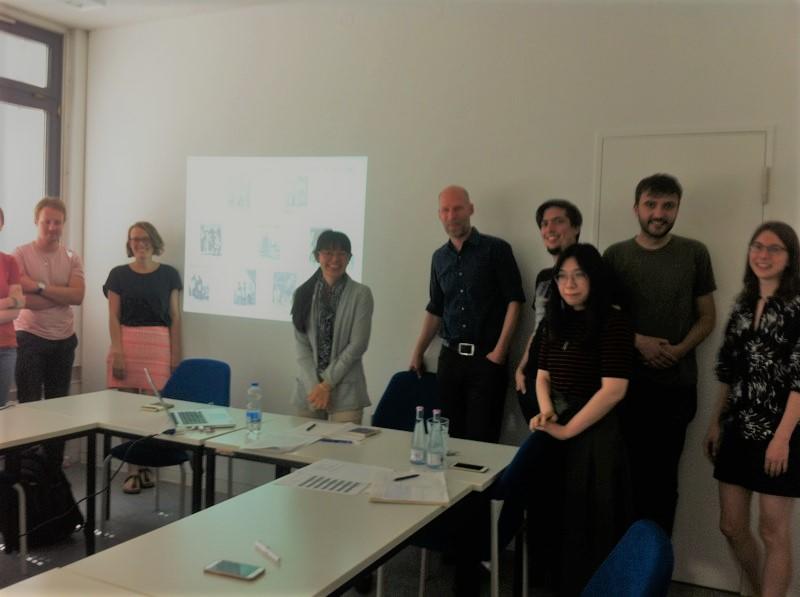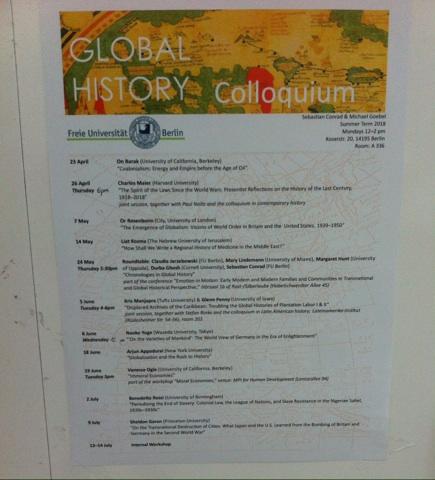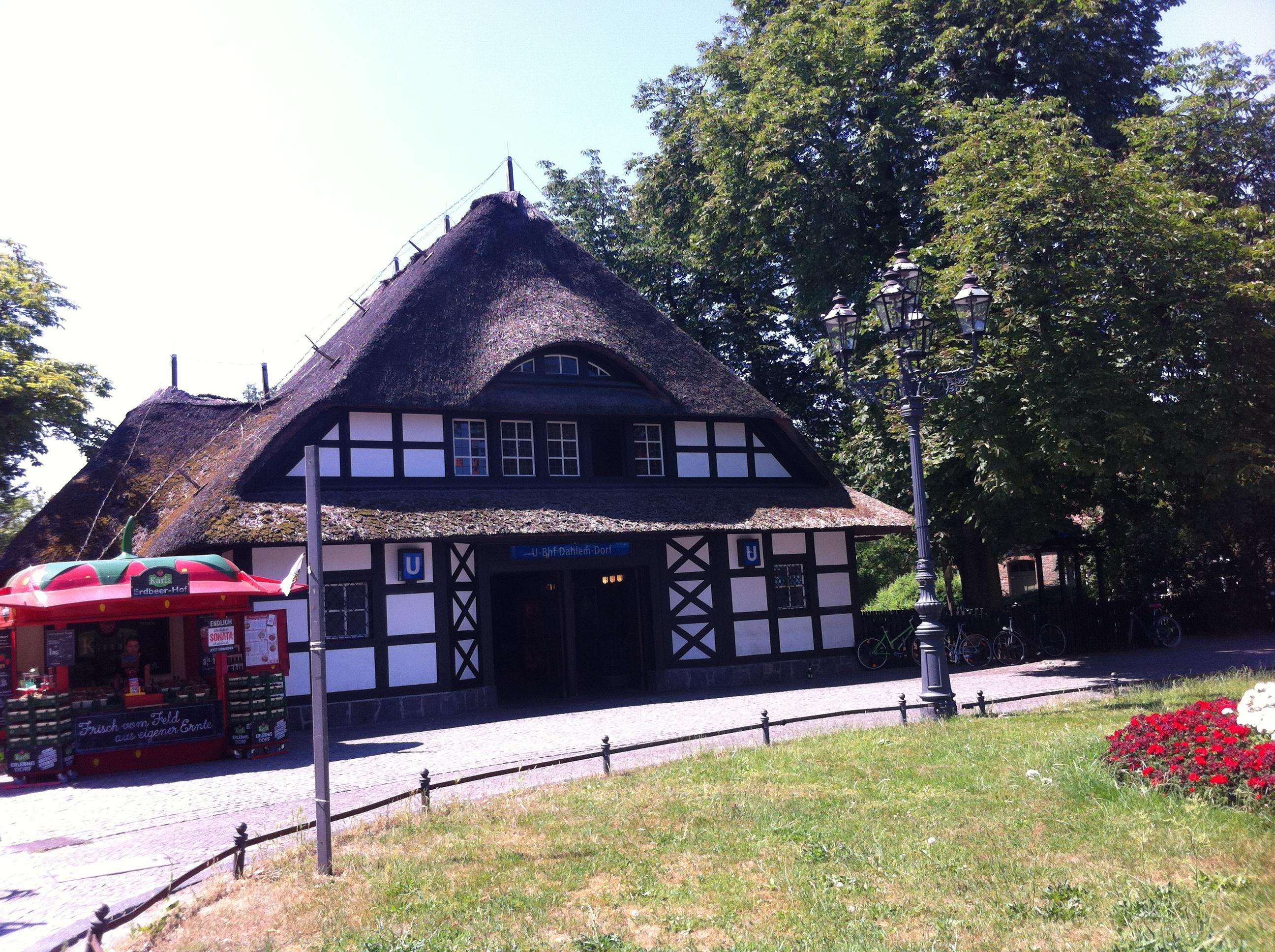2018.06.18
弓削尚子教授:ベルリン自由大学研究者交流 / Prof. YUGE Naoko : The Free University of Berlin Researcher Exchange Report
2018年6月3日から6月11日までの旅程でドイツを訪れた。最大の目的は、ベルリン自由大学グローバルヒストリー・センターで行われたコロキウムでの報告である。2018年度夏学期のコロキウムは、米国、英国、イスラエル、ドイツの大学で教鞭をとる歴史家が一回ずつ講義を担当し、私は、唯一、東アジアからの話し手であった。
6月6日の12時すぎ、セバスティアン・コンラート教授の司会により、「『人類の多様性』―ドイツ啓蒙期における世界観」という題目で1時間ほど話した。図像史料の読解を中心に、18世紀後半に登場した「人種」の分類を通俗科学的な視点からとらえ直し、ヨーロッパ中心主義的な思想の生成と浸透をあぶり出すという趣旨であった。コンラート教授による「啓蒙主義のグローバルヒストリー」を念頭に、ドイツの「人種」論の明治期日本における受容にも図像史料を使って触れた。
参加者は15名ほどで、図像史料の解釈や啓蒙期のメディアのありかた、ドイツ啓蒙主義の特徴に関する質問のほか、カントの自然地理学を批判するコメントなどを受け、示唆に富んだ2時間であった。ベルリン滞在中のシェルドン・ギャロン教授(プリンストン大学)や楊大慶教授(ジョージ・ワシントン大学)からコメントをいただけたのもありがたかった。 報告の前日の6月5日には、同コロキウムがラテンアメリカ研究所と共催して行われた、カリブ世界とプランテーション労働について、著名な米国の研究者(K, Manjapra, G. Penny)による講演を聴講することができた。
6月9日、10日の週末には、グローバルヒストリーを専攻する学生が企画する「第4回グローバルヒストリー学生会議」があり、世界各地の学生による研究報告が印象に残った。 これらに参加したことで、終始、頭をよぎったのは、グローバルヒストリーを論じるツールとしての言語の問題であった。グローバルヒストリーが歴史学の一角を占め、研究者層の厚みが感じられる一方で、英語〈のみ〉による議論空間に違和感を覚えたのも確かである。グローバルヒストリーは、史資料にアクセスでき、旅費や言語能力のある者のみに許される「贅沢」なのではないかというジェレミー・エイデルマン教授の言葉が何度も思い出され、自分の立ち位置について考えさせられた。
言語の問題については、6月7日に歴史博物館で開催された「植民地の展示物と歴史的正義」と銘打ったシンポジウムに参加し、「学生会議」でのコンラート教授の基調講演を聞いたときにも感じられたが、グローバルヒストリーの社会的意味や今後の展開について学べたことは有意義であった。
本事業の初年度にあたる2014年にベルリンで開催された「グローバルヒストリーは真にグローバルなのか」というワークショップに参加したのは冬であった。今回、バラの花が咲きほこる美しい季節にベルリンを再訪し、この4年間を私なりに振り返ることができた。連日、30℃を超す暑さの中で、明るい陽射しを受けて、その成果を形にするためのエネルギーを得られたような気がした。
(弓削尚子)
I visited Germany from the 3rd to the 11th June 2018. The main purpose of my visit was to present a paper in the colloquium held by the Center for Global History of the Free University of Berlin. The colloquium for the summer semester of 2018 has consisted of lectures by historians from the USA, England, Israel, and Germany, but I was the only speaker from East Asia.
My talk, titled “Variety in the Human Race: The German View of the World in the Era of Enlightenment”, started around noon on the 6th of June and was moderated by Prof. Sebastian Conrad. I mainly analyzed visual material sources to reconsider, from the view of popular science, “race” classifications that appeared in the second half of the 18th century; through this, I examined the rise and spread of Eurocentric thoughts. Keeping in mind Prof. Conrad’s discussion about the “Global History of the Enlightenment”, I also discussed the reception of “race” classifications suggested by a German scholar Germans in the Era of Japanese Enlightenment.
About 15 participants attended my lecture and asked questions concerning the interpretations of the visual sources, media in the Enlightenment, and the traits of the German Enlightenment; there were also critical comments about Kant’s physical geography and so on. It was two hours filled with insights and intellectual stimulation. I was grateful that Prof. Sheldon Garon (Princeton University) and Prof. Daqing Yang (George Washington University) were present and gave me comments.
On the previous day, the 5th of June, a joint session with the Latin American Institute was held. Eminent historians from the USA (K. Manjapra and G. Penny) gave lectures on the Caribbean world and plantation labor. On the weekend of the 9th and 10th of June, “The Fourth Global History Student Conference” took place and students from various countries gave papers, which impressed me. During these events, I became aware of the issue of the language used to discuss global history. The discussions made it clear that global history deserves to be recognized as an established field in historiography and that there are a wide range of researchers in this field; but I could not help but questioning the fact that discussions were conducted only in English. I kept thinking of misgivings Prof. Jeremy Adelman had about global history becoming “a luxury” for exclusively for those who have access to material sources, funding for research trips, and linguistic ability. This made me reflect upon my positionality. I also took part in the symposium on “Colonial Objects and Historical Justice” held in the Historical Museum on the 7th of June. And I attended Prof. Conrad’s keynote lecture for the Student Conference. While the language issue continued to cross my mind, both events made clear the social significance and future possibilities of global history.
In 2014, the inaugural year of this core-to-core program, I traveled to Berlin to take part in a workshop titled “Is Global History Truly Global?”; it was winter then. This time in Berlin, the weather was beautiful, and roses were in bloom; and I was able to look back on the research I have done these past four years. The hot days of over 30 degrees and the bright sunshine of Berlin gave me renewed energy to prepare for publication the work I have done.
(YUGE Naoko)





















